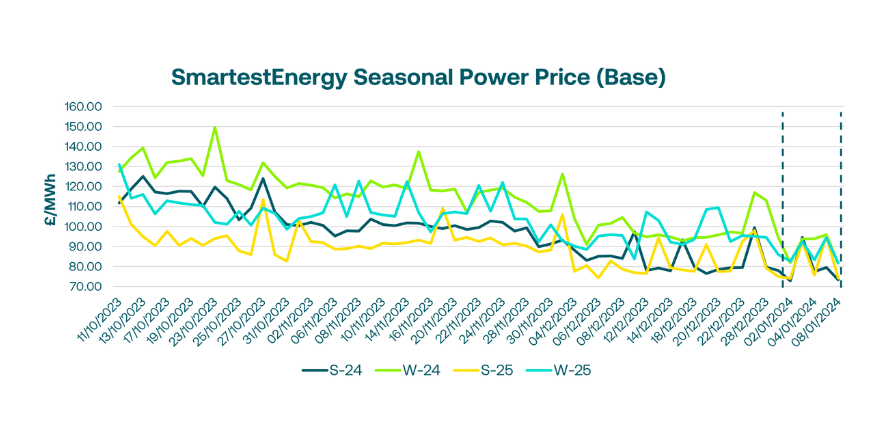Posted on: 09/01/2024
Head of Sales Trading, Fanos Shiamishis, reports on energy market activity, covering the period 2nd – 8th January 2024. On our end-of-day pricing tool, The Source, we published an in-week high of £ 94.50 MWh for the Summer-24 seasonal power price on 3rd January. In this blog, Fanos shares the market news and updates from the last week.
The New Year started bearish, with near-term gas prices reaching a new low as the incoming cold spell was expected to be shorter than anticipated and demand was muted. Power came off sharply due to a drop in both EUA and UKA emissions markets, with the Q2-24 spark spread trading £1.65/MWh lower than the past week.
Into the week, fundamental drivers opened strong for NBP and TTF, with temperatures turning colder and wind forecasts reduced. With heating demand expected to increase and lower renewable generation, prices firmed, but supplies remained stable and inventories strong. Across the Atlantic, US natural gas prices gained around 5% in response to reduced daily output and a significantly colder than expected end to January.
As cool weather and low wind generation continued, the UK gas system opened undersupplied on Thursday. UK Power was illiquid past the front three seasons and traded marginally higher as a pullback on emissions limited the gains from a strong NBP market. Meanwhile, in Finland, temperatures dropped to as low as -35°C, causing the Finnish day ahead baseload to clear at €890/MWh, an unsustainable level that caused worry for large industrial consumers if it persists.
On Friday, continued cooler outlooks and lower renewable generation supported near-term power and gas prices across the UK and continental Europe. Price gains were limited, whilst storage levels across Europe remained high.
Early this week, gas prices pared back with strong LNG and pipeline supplies offsetting the impact of high demand as temperatures continue to fall further. Recent LNG supplies were disrupted due to unfavourable berthing conditions and the backlog commenced unloading yesterday.

 United States
United States Australia
Australia






